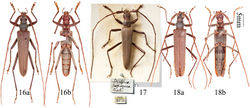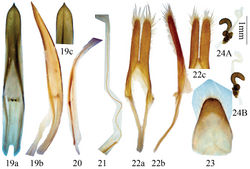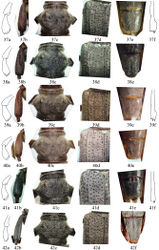Distenia japonica
| Notice: | This page is derived from the original publication listed below, whose author(s) should always be credited. Further contributors may edit and improve the content of this page and, consequently, need to be credited as well (see page history). Any assessment of factual correctness requires a careful review of the original article as well as of subsequent contributions.
If you are uncertain whether your planned contribution is correct or not, we suggest that you use the associated discussion page instead of editing the page directly. This page should be cited as follows (rationale):
Citation formats to copy and paste
BibTeX: @article{Bi2013ZooKeys275, RIS/ Endnote: TY - JOUR Wikipedia/ Citizendium: <ref name="Bi2013ZooKeys275">{{Citation See also the citation download page at the journal. |
Genus: Distenia
Name
Distenia japonica Bates, 1873 – Wikispecies link – Pensoft Profile
- Distenia japonica Bates, 1873: 155.
- Distenia gracilis: Kraatz 1879[1]: 91; Švácha and Danilevsky 1987[2]: 38 [part]; Lin et al. 2010[3]: 120 [part].
- Distenia gracilis gracilis: Ohbayashi and Niisato 2007[4]: 335, pl. 1, figs 1 (male) & 2 (female) [Fauna].
- Distenia japonica: Danilevsky 2012[5]: 902.
Host plant
It is polyphagous with the following host plants recorded under Distenia gracilis (confused with Distenia japonica): Acer sp. (ACERACEAE), Abies sachalinensis Masters (PINACEAE), Alnus sp. (BETULACEAE), Betula sp. (BETULACEAE), Chosenia sp. (SALICACEAE), Picea sp. (PINACEAE), Pinus sp. (PINACEAE), Quercus sp. (FAGACEAE), Salix sp. (SALICACEAE), Ulmus sp. (ULMACEAE).
Diagnosis
According to Danilevsky (2012)[5], Distenia gracilis Blessig, 1872 (mainland and Sakhalin) and Distenia japonica Bates, 1873 (islands) are different vicariant species, very easily distinguished by narrow scapus in Distenia japonica. Further differences are shown in Table 1.
Remarks
This species was first described by Bates (1873)[6] based on syntypes from Japan, Honshu (Hyogo Prefecture), Maiyasan, collected by George Lewis. Kraatz (1879)[1] synonymized it with Distenia gracilis, which was widely followed by subsequent authors until Danilevsky (2012)[5] resurrected it.
Švácha and Danilevsky (1987)[2] pointed out the habit differences between the mailand population and island population, and suspected “it is possible that we are facing two separate taxa”. “However, reliable larval morphological differences have not been found.” (Švácha and Danilevsky 1987[2]). According to Danilevsky (2012)[5], Distenia gracilis (mainland and Sakhalin) develops underground on healthy roots of living Chosenia (personal observation in Kedrovaya Pad) and on Alnus, but Distenia japonica lives under the old dead bark of many different trees (personal observation on Kunashir), often together with Eutetrapha. Therefore, the host plants recorded under Distenia gracilis could actually be host plants of Distenia japonica.
Distribution
Japan, Russia (Far East, Islands).
Specimens examined
Japan: 1 male, syntype, Japan (NHML, ex collection G. Lewis, examined through pictures); 1 male, Japan, Iwate Prefecture, Niisato-mura, Genbeidaira, 1982.VII.31, coll. N. Ohbayashi (CBWX); 1 female, Japon, Iwate Prefecture, Niisato-mura, Genbeidaira, 1982.VII.31, coll. N. Ohbayashi (CBWX); 1 male 1 female, Kyoto, Kibone, 1932.VII.1, coll. S. Yie (IZAS); 1 female, Tokushima, Mt. Tsurugi, 1971.VII.11, coll. H. Toshima (IZAS); 1 female, Tottori Pref., Mt. Hokki-Daisan, 1958.VII.22, coll. H. Toshima (IZAS).
| Species / Character | Distenia gracilis | Distenia japonica | Distenia orientalis sp. n. |
|---|---|---|---|
| Antennal segment extending beyond tip of elytra | in male 8th, in female 9th | in male 8th, in female 9th | in male 7th, in female 8th |
| Color of antennae and legs | uniformly black-brown | Uniformly brown | Mostly black-brown, with several orange-red rings |
| Scape in male | With basal grooves, punctures coarser | With basal grooves, punctures finer | Without basal grooves, with rugose punctures |
| Scape length / maximum width | ca.3.0 in male, ca. 2.8 in female | ca.3.5 in male, ca. 3.0 in female | ca.3.1 in male, ca. 3.4 in female |
| Last segment of maxillary palp | Stouter, length / maximum width < 2.5 in male, < 2.6 in female (Figs 37a, 38a) | Stoutest, length / maximum width < 2.1 in male, < 2.4 in female (Figs 39a, 40a) | Slender, length / maximum width > 2.5 in male, > 3.0 in female (Figs 41a, 42a) |
| Pronotum | Without transverse rugae, swelling indistinct (Figs 37c, 38c) | Without transverse rugae, swelling more distinct (Figs 39c, 40c) | With some transverse rugae (Figs 41c, 42c) |
| Mosotibiae of male | Apical protruding lobe very distinct (Fig. 37f ) | Apical protruding lobe distinct (Fig. 39f) | Without apical protruding lobe (Fig. 41f) |
| Punctures on elytra | With distinct longitudinal rows, the row near suture not very dense (Figs 37d, 38d) | With distinct longitudinal rows, the row near suture very dense (Figs 39d, 40d) | Longitudinal rows indistinct, the row near suture very sparse (Figs 41d, 42d) |
| Sternite VII (ventrite V) | Figs 37e, 38e | Figs 39e, 40e | Figs 41e, 42e |
| Median lobe | Figs 5, 12 | Figs 19 | Figs 29 |
| Spermathecal capsule | Figs 10–11 | Figs 24 | Figs 34–36 |
Taxon Treatment
- Bi, W; Lin, M; 2013: Description of a new species of Distenia (Coleoptera, Disteniidae, Disteniini) from Southeastern China, with records and diagnoses of similar species ZooKeys, 275: 77-89. doi
Other References
- ↑ 1.0 1.1 Kraatz G (1879) Ueber die Bockkäfer Ost-Sibiriens, namentlich die von Christoph am Amur gesammelten. Deutsche entomologische Zeitschrift 23 (1): 77-117.
- ↑ 2.0 2.1 2.2 Švácha P, Danilevsky M (1987) Cerambycoid larvae of Europe and Soviet Union (Coleoptera, Cerambycoidea). Part I. Acta Universitatis Carolinae (Biologica) 30: 1-176.
- ↑ Lin M, Liu Y, Bi W (2010) Newly recorded species of Disteniidae (Coleoptera) from China, with a catalogue of Chinese Disteniidae. Entomotaxonomia 32 (2): 116-128.
- ↑ Ohbayashi N, Niisato T (2007) Longicorn Beetles of Japan. Tokai University Press, Kanagawa, 818 pp.
- ↑ 5.0 5.1 5.2 5.3 Danilevsky M (2012) Additions and corrections to the new Catalogue of Palaearctic Cerambycidae (Coleoptera) edited by I. Löbl and A. Smetana, 2010. Part. VI. Humanity Space. International Almanac 1 (4): 900-943.
- ↑ Bates H (1873) On the Longicorn Coleoptera of Japan. The Annals and Magazine of Natural History, London (4) 12(68): 148–156.
Images
|


